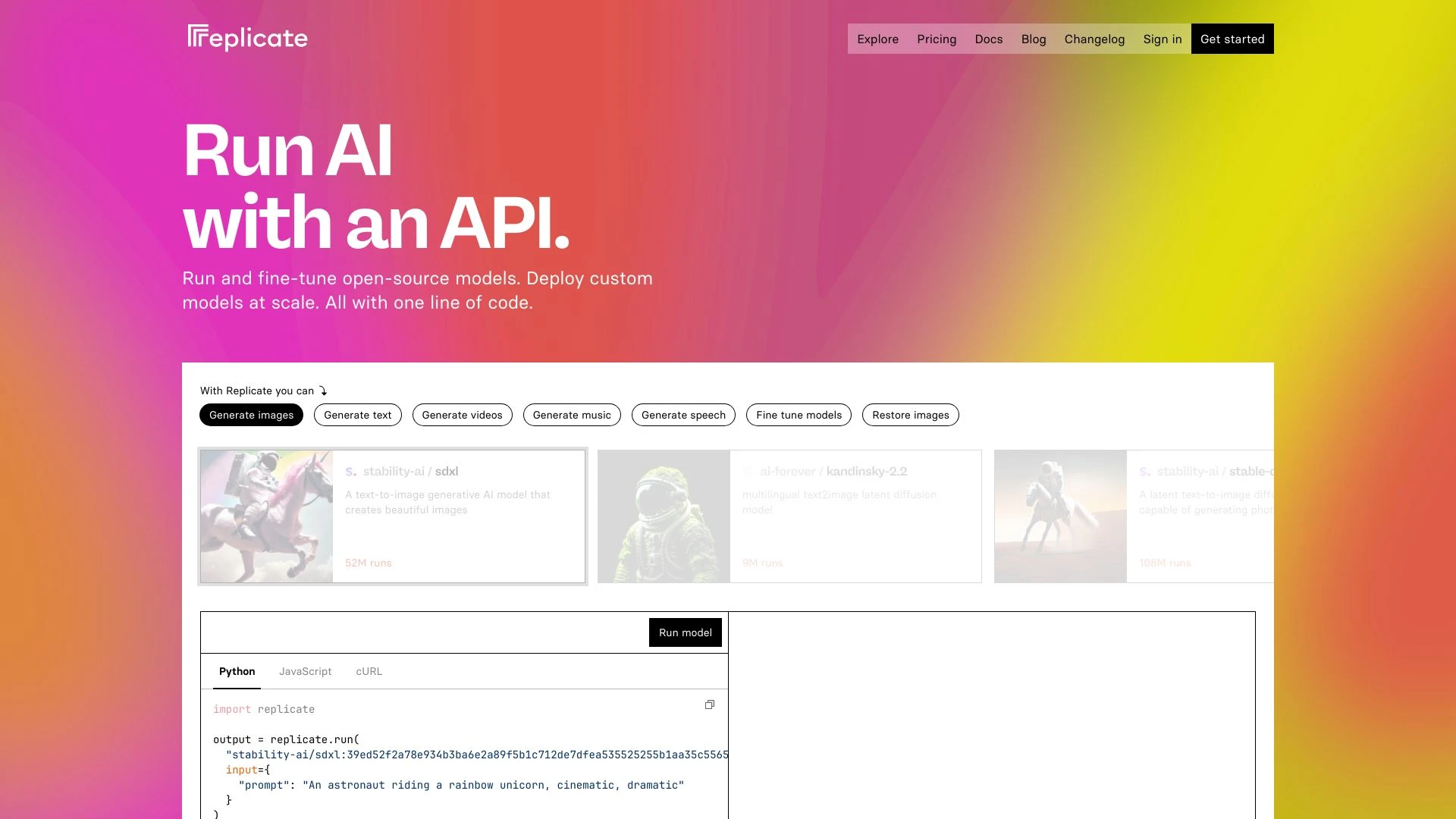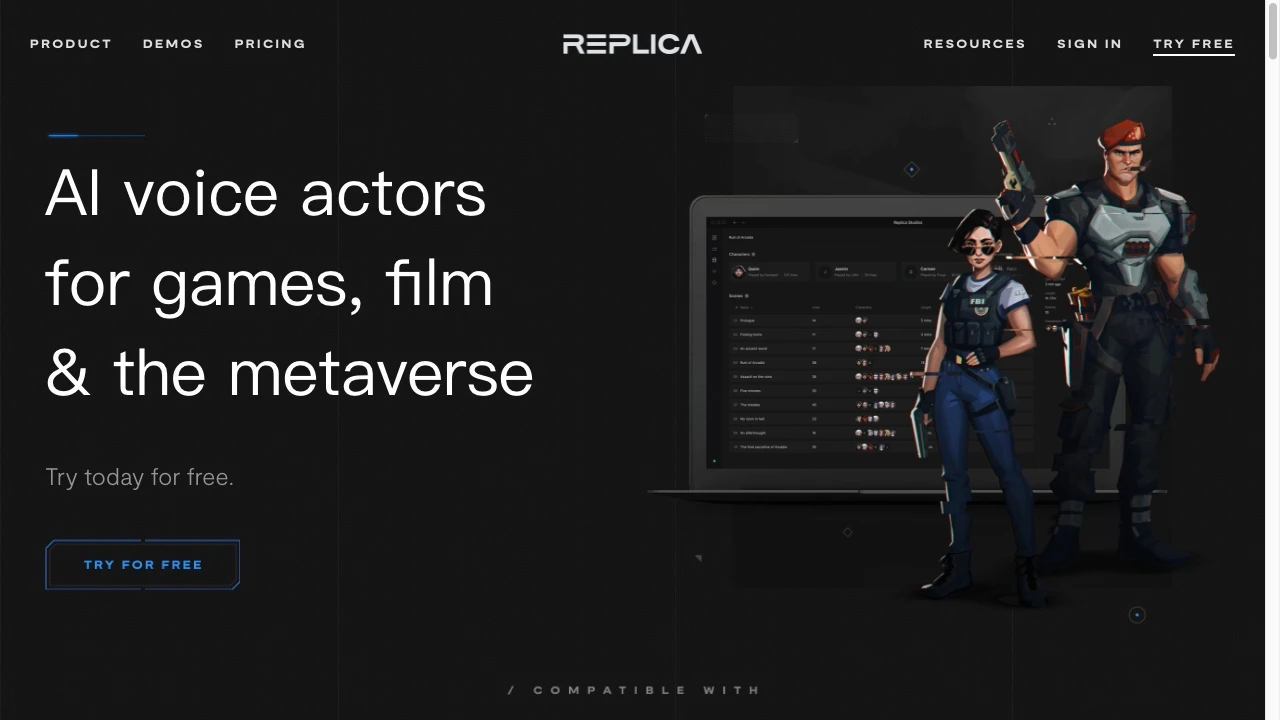Replicate AI versus Replica Studios
Replicate AI, founded in 2020, focuses on deploying machine learning models, catering to developers and researchers needing easy access to AI tools. Replica Studios, launched in 2018, specializes in AI voice synthesis, targeting content creators and game developers for high-quality voiceovers. Both platforms enable innovation, but in different facets of AI technology.


Replicate AI
Ideal For
Generate images from textual descriptions
Create unique written content
Produce music compositions
Deploy tailored machine learning solutions
Key Strengths
User-friendly interface for model deployment
Ability to fine-tune and customize models
Cost-effective solution for running various models
Core Features
Run open-source machine learning models
Fine-tune models with custom datasets
Deploy custom models using Cog tool
Easy integration with just one line of code
Cost-efficient scalability for models
Replica Studios
Ideal For
Game development
Film production
Animation creation
Voiceovers for advertisements
Key Strengths
Access to a large selection of voices
High-quality, realistic voice performance
Easy audio export in multiple formats
Core Features
Extensive library of AI voice actors
Naturally expressive voice generation
Advanced Text-to-Speech technology
Performance direction and voice auditioning
Customizable audio export options
Popularity
Decision Matrix
| Factor | Replicate AI | Replica Studios |
|---|---|---|
| Ease of Use |
|
|
| Features |
|
|
| Value for Money |
|
|
| Interface Design |
|
|
| Learning Curve |
|
|
| Customization Options |
|
|
Quick Decision Guide
- You want seamless integration with existing workflows.
- You aim for rapid deployment and prototyping.
- You value cost-effective solutions for AI projects.
- You look for an intuitive user interface for all skill levels.
- You desire access to a diverse range of pre-trained models.
- You value realistic voice generation for projects.
- You aim for quick integration into your workflow.
- You want diverse voice options for character development.
- You look for easy customization of voice attributes.
- You appreciate high-quality audio output without fuss.
What Our Experts Say
Replicate AI excels in generating high-quality, custom machine learning models, making it ideal for developers needing flexibility in AI solutions. In contrast, Replica Studios specializes in voice synthesis and is best for creating realistic voiceovers in media projects. Common challenges with Replicate AI include model training complexity, while Replica Studios may struggle with voice variety. Each shines in its niche: Replicate AI in versatility and Replica Studios in immersive audio experiences.
Jamie Davis
Software Analyst
At a Glance
Replicate AI focuses on high-level machine learning model deployment, allowing developers to run various AI models via an API, ideal for diverse AI applications. Replica Studios specializes in AI voice generation, providing customizable voice avatars for media production. Pros: Replicate AI - model flexibility, extensive API support. Replica Studios - quality voice synthesis, user-friendly software. Cons: Replicate AI - technical complexity, requires coding. Replica Studios - limited to audio applications. Recommendation: Use Replicate AI for developers needing diverse AI solutions; choose Replica Studios for content creators seeking high-quality voiceovers.
Pricing and Subscription Plans
Replicate AI offers a pay-as-you-go model, where users pay based on the number of API calls, starting with a free tier for limited usage. Pricing can escalate based on volume and additional features. Replica Studios features subscription plans starting at $29/month, granting access to various voice assets. This is ideal for small to medium businesses. Large enterprises may find both platforms scale effectively but should evaluate overall usage for cost-efficiency.
Performance Metrics
Replicate AI excels in speed with rapid model deployment, making it ideal for real-time applications. In contrast, Replica Studios offers superior accuracy in voice synthesis, particularly for creative content. Reliability is consistent across both platforms, yet Replicate AI outperforms in robust API integrations, while Replica Studios shines in nuanced emotional delivery.
User Experience
Replicate AI offers a clean, intuitive interface that emphasizes ease of navigation and customization, making it suitable for both beginners and advanced users. Its learning curve is moderate, bolstered by solid user support resources. In contrast, Replica Studios boasts a user-friendly design with streamlined navigation and extensive customization options. The learning curve is minimal, supported by comprehensive tutorials and a responsive help center. Both platforms prioritize user experience effectively.
Integrations and Compatibility
Replicate AI offers seamless API integration, supporting tools like TensorFlow and PyTorch. In contrast, Replica Studios focuses on voice synthesis, integrating with platforms like Unity and Unreal Engine. Both enhance workflows but target different creative sectors.
Limitations and Drawbacks
Replicate AI may struggle with complex tasks and real-time responsiveness, while Replica Studios often lacks variety in voice modulation. Both can produce generic outputs. Workarounds include using fine-tuning, combining tools, and integrating user feedback for improvement.